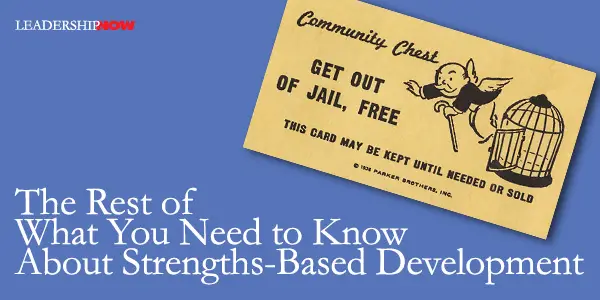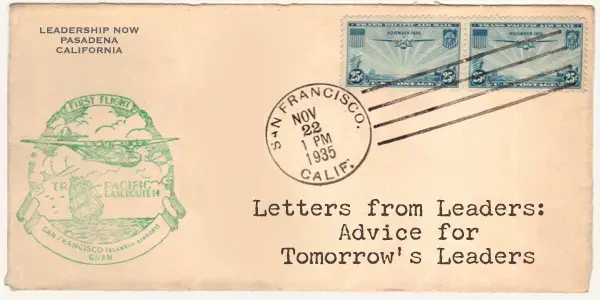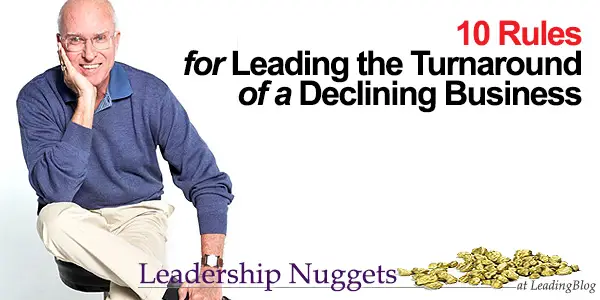 Leading Blog | Posts by Month |
 Leading Blog | Posts by Month |
07.31.09

LeadershipNow 140: July 2009 Compilation
Posted by Michael McKinney at 06:21 PM
07.30.09

Emotional Intelligence: Self-Awareness
WITHOUT self-awareness leadership becomes just another exercise in ego gratification. Self-awareness allows for self-discipline and control of the ego. Without it the ego runs amok looking after itself and only incidentally in the service of others if the needs of both happen to align. Self-awareness is the ability to see when an emotion or a perception is influencing your thinking and behavior and, if necessary, do something about it. Gaining control over the state of your mind will pay big dividends in terms of your leadership effectiveness. What is going on beneath the surface? It is the blind spot of leadership. Being able to step back and see both the positive and negative aspects about yourself, to see how you affect others, and to see how you are behaving in real-time, is critical to your success as a leader. Emotional Intelligence 2.0 offers some good strategies to develop your self-awareness as part of an overall EQ skill development program. Self-awareness is a bigger problem than one might think. The book reports that “only 36 percent of the people tested were able to accurately identify their emotions as they happen. This means that two-thirds of us are typically controlled by our emotions and are not yet skilled at spotting them and using them to our benefit.” A proper and healthy self-awareness facilitates an essential other-awareness that is vital to good leadership. You can not manage the behaviors of others without first getting a handle on your own.
Posted by Michael McKinney at 11:33 PM
07.27.09

5 Leadership Lessons: Getting Your Relationships Right Townsend wrote Leadership Beyond Reason to help you understand and utilize the soft skills – that which is beyond reason. He says “you ignore what is beyond reason at your own peril….Leading from your inner world ultimately produces better results in your leadership.” He divides our inner world into five areas: values, thoughts, emotions, relationships and transformation. As leadership is about connecting with those you lead and a primary focus of leadership, let’s pull five lessons from Townsend on relationships: Developing your relational abilities will help you read the landscape. Townsend adds, “The leader who misses relational aspects is surprised when people become distant, resentful, or just leave. The relational leader sees the signs coming a long way away and has time to do something about them.”
Posted by Michael McKinney at 09:51 AM
07.20.09

That's One Small Step for Man, One Giant Leap for Mankind: An Apollo 11 Lesson The Apollo 11 mission was a success in large part because it was supported by everyone. Not just NASA, but congress and the American people. It was truly a national project. It taught us to work through our unknowns and have faith in our ability to learn and grow. President John F. Kennedy told an audience at Rice University on September 12, 1962: We choose to go to the moon in this decade and do the other things, not because they are easy, but because they are hard, because that goal will serve to organize and measure the best of our energies and skills, because that challenge is one that we are willing to accept, one we are unwilling to postpone, and one which we intend to win, and the others, too.True accomplishments come from doing the hard thing and not resting on the easy things. Raise your expectations. Don’t rob yourself of your potential future. Strive to do the hard things.
Posted by Michael McKinney at 12:59 PM

Maxims for Life: You Don’t Have to Learn the Hard WayEntrepreneur J. R. Parrish has distilled some real world lessons from his own life experience and from the teachings he gained from his mentor at an early age. You Don't Have to Learn the Hard Way is designed as a guide book for young people. In a world haunted by the relative, finding anchors for your life is not as readily available as it should be. Beginning life with a relative mindset is a recipe for disaster. When good advice comes along it is important to take notice of it and see how it fits in with your values and the outcomes you want for yourself.If you are fortunate enough to find a good mentor to aid you, it’s important to take them seriously if you want to get the full benefit. Once you find a mentor, it’s essential that you show respect and never become a “Yeah, but.” If your mentor tells you your hair is too long and needs to be cut, do it. Don’t ever say, “Yeah, but I had it short and that didn’t help.” Whatever your mentor suggests, do it and do it immediately if you want him or her to continue to help you. It’s one thing to do what your mentor suggests and report back how it went and quite another to question the advice without trying it. You won’t last long if you resist suggestions.A mentor or a book like this can help you to gain vicariously what many people end up learning the hard way. Here are several maxims found in Parrish's book that are good to think on: The book also contains some self-discovery quizzes that are also found on the accompanying web site. Get this book for any young adult you know … and read over their shoulder.
Posted by Michael McKinney at 10:32 AM
07.16.09

Will You Survive After Getting to the Next Level?In The Next Level, Scott Eblin cites research that finds that 40 percent of new executives fail within eighteen months of their promotion. In addition, researchers at Development Dimensions International, conducted a poll of 785 business leaders and found that 40% of managers get little or no support as they enter their new jobs. What begins as one of the best moments in your career can turn out to be one of the most stressful events of your life.“If success at the next level comes down to just one thing, it may be the art of strategic choice,” writes Eblin. “Making the choice to pick up a new behavior or belief or to let go of one that is no longer serving you requires the capacity to step back and ask yourself, ‘Given what I am trying to do or accomplish, is this serving me?’” A great question but easier said than done. With a new role comes a new set of expectations requiring a new set of competencies. In other words, what got you here won’t get you there. Part of the problem faced by newly promoted executives is that while the expectations are high, they are not clearly stated. Considering the inevitable uncertainty and doubt that comes with the territory, it’s not surprising that newly promoted executives easily fall back on practices that no longer serve their interests. Eblin has defined nine set of key behaviors and beliefs that new executives need to pick up and let go of to succeed. “This process of picking up and letting go, I’ve learned, is central to succeeding at the executive level.” Asking “Given what I am trying to do, is this serving me?” is good advice at any level.
Posted by Michael McKinney at 11:01 PM
07.14.09

Disconnecting Horizontally
IN HIS excellent analysis of How Rome Fell, historian Adrian Goldsworthy makes some interesting observations about how we tend to disconnect horizontally from anyone or anything outside of our group. We lose our sense of place, and this makes any change so much harder. People resist change when they can't see the bigger picture and why it is necessary. The challenge is to cross our self-imposed boundaries into a world not of our own making and connect to the outside both personally and organizationally.
And this on ever-expanding bureaucracy: By their nature, bureaucracies tend to grow. This was true in the Roman Empire, let alone with the massively larger government agencies of modern countries. Individuals within a department obviously have to focus on a particular task. It is only natural to believe that with more people they could deal with this more effectively. The larger they grow, then the more distant most members will be from the reality of the overall function of the department, and they will become even more removed in their way of thought to anyone outside. This is not inevitably a bad thing, but it does mean that they will continue to expand unless restrained, since their problem or concern is the only one they will see. 
Posted by Michael McKinney at 11:55 PM
07.13.09

The Rest of What You Need to Know About Strengths-Based Development
There is no arguing the fact that we all have various combinations of strengths in varying degrees. Maximizing the use of those strengths as we can, in the context we find ourselves in is advantageous to all involved. If you can carve out a place in the world that leverages your strengths that’s great, but the reality is that the world keeps changing and what is required of you to stay relevant – valuable – keeps changing too. You may need to develop a new strength and turn some of your weaknesses around. Then there is the question of whether or not your particular brand of strength is marketable. I may derive pleasure, feel actualized, and be in my zone by utilizing one of my strengths, but if it isn’t competitive with what others are doing with that same strength, well then, I’ll be out of work. Great hobby, but not a career (at least not at my current level of competence). Robert Kaiser has assembled fifteen authors in The Perils of Accentuating the Positive to help you get some perspective on the strengths movement. Kaiser writes that the point of the book “is not to dismiss strengths-based development.” It’s really a guide to make you a “savvier user of the strengths-based approach” and based on an understanding that “recognizes that both strengths and weaknesses have an appropriate place in learning and development.” In an interesting analysis by Korn/Ferry of 360 assessments of almost 2000 individuals, they found that most managers don’t have the leadership strengths that their companies need for them to have in order to be effective. The reality is, most people need to develop strengths that don’t come naturally to them. That means if you want to stay competitive – stand out from the crowd – you need to begin now to develop the strengths you don’t have now that are required for your long-term success. They bring out four ways to look at strengths: Your Personal Best: What comes naturally to you
If you plan to succeed by focusing on your strengths, make sure you do more than just discover and build on your strengths (your personal best). You will also need your strengths to stand out compared to your peers (competitive strengths). If you want to stand out among your peers and have a better chance for promotions, make sure your strengths set you apart from other also competitive peers (distinctively competitive strengths). Finally, you better hope that your five distinctive and competitive strengths include the ones that make a difference when it comes to long-term career success (competitive and aligned strengths). As we have stated here before, the overuse of a strength can be a weakness. In addition, USC professor Morgan McCall writes, “Strengths that have led to success, the very ones that advocates claim should be played to, can become weaknesses over time or in a new situation.” As our reality changes, we must also change. When we rely too much on our strengths we usually end up emphasizing them to the point where they become weaknesses and derail our career and relationships. I will say that Marcus Buckingham’s excellent film Trombone Player Wanted does speak eloquently to the tendency to obsess on the negative and systems designed to stifle the development of our strengths and create people that fit a predetermined mold. At the same time, as leaders, we do need to be working at placing people in positions where they can play to their strengths as much as possible. All too often people end up in positions that they never wanted or imagined for themselves and really have no business being in. Their effort can only be mediocre at best. We need to utilize our strengths and be proactive in our career and life decisions in an intelligent way. The tempering given to an obsessive strengths-only approach offered in The Perils of Accentuating the Positive helps you do just that.The bottom line is self awareness and adaptability. There are no shortcuts. Play to your strengths as you can but don’t be over-reliant on them. Develop new strengths as required. Manage your liabilities. Of Related Interest:
Posted by Michael McKinney at 01:35 PM
07.09.09

The Natural Authority that Comes From Being AuthenticA thoughtful framework from which to view leadership was revealed in an interview and presented in Leading for Success by Andrew and Nada Kakabadse and Linda Lee-Davies. Sr. Judith Zoebelein, a Franciscan Sister of the Eucharist, makes a clear statement about the dynamics of authentic leadership. It also underscores the fact that no one can or should be the “leader” all the time. She states:I do believe that everybody has authority. Living in communities you really come to recognize the gifts and the leadership of each person in different areas. That person may not be the superior and in charge of the house, but if for example, I need someone to come out and help feed goats, I know exactly who I am going to ask, because that Sister has a giftedness with animals. She has the knowledge and intuitive sense about animals that perhaps I don’t have. We call this “authority,” an authority that is authoring life, opening up a new awareness in others. When I work with her, I gain a lot; understand through her something new which is not natively mine to understand.
Posted by Michael McKinney at 11:03 PM
07.06.09

Letters from Leaders: Advice for Tomorrow's Leaders
OVER A PERIOD of seven years Henry Dormann has compiled 77 letters from political, religious and business leaders targeted at motivating young leaders and teaching them what is needed to be great. The advice and stories found in Letters from Leaders gives you a lot to think about. Here are a few thought starters: King Abdullah II of Jordan offers this encouragement to those in any walk of life that are making the commitment to lead:

 
Posted by Michael McKinney at 02:12 AM
07.03.09

What You Need to be Doing NowGeoff Colvin, Fortune’s senior editor at large and author of The Upside of the Downturn, offers much to savor and chew on, but his list of five things this recession demands from a leader are essential.One of those behaviors is Be Decisive. He writes, “Leaders in a crisis must not lose their rare opportunity to act. The difficulty is that just when decisions are most easily accepted, they’re hardest to make. All business decisions are made with incomplete information, and that’s especially true in the heat of a crisis. At the same time the stakes are higher than usual. Every instinct tells you to decide more slowly than usual, yet it’s vital that you decide more quickly.”
Posted by Michael McKinney at 01:42 PM

10 Rules For Leading the Turnaround of a Declining Business
I have been involved in turnaround situations at Topco Associates, Kayser-Roth Corporation, and Cordiant. The similarities between these situations were greater than the differences. In each case, they were companies that had fallen on hard times, but there was a belief that they could rise again like a phoenix from the ashes. Additionally, the fact that the companies were not doing well was by no means a secret to the employees, who were always eager to have the leadership that could bring it all back together and get things moving again.Here are my ten rules for a successful turnaround: Rule 1. When formulating goals, start with the answer and work your way back to the solution. Do not get bogged down in the morass of yesterday. Get going toward where you need to be in the immediate future. At Cordiant, we developed a five-year financial forecast within three months of arrival that we used as the basis for refinancing the company. Subsequently, we exceeded every benchmark of that forecast. Rule 2. Get out in front of people immediately and position yourself as the new leader in the company. Tell them who you are, what you believe in, why you are there, your perspective on the situation, and how you intend to proceed. At Cordiant, I visited all the principal people and major locations in London and New York in my first two days. Rule 3. Bring an extraordinarily high sense of urgency to what you are doing, but also look before you leap. People are anxious for results, but this is no time for dead ends. Think carefully about everything you do, but keep moving. At Topco, we immediately commenced development of a line of environmentally-friendly products because there was an obvious niche and need in the market for them. Rule 4. Do not sit around headquarters! Get out to where the work is done—plants and field offices. You need this input, and you need to be a motivating force for people. At Cordiant, I got around to offices accounting for 60% of our revenues in the first six months. Rule 5. Go out and listen to customers and clients. At Kayser-Roth, one of my first visits was to Wal-Mart. They told me, “Mr. Seelert, we are concerned about the viability of your company as a supplier.” Two years later, we were named their vendor partner of the quarter. If I had not personally gone there to listen and learn, I doubt that this would have happened. Rule 6. Listen to everybody in the organization who offers an opinion about the business—don’t just hang around with the people who report to you. There are two sides to all coins and stories. You need to understand both. If you can, meet with your competitors or the heads of similar organizations. When I went to Cordiant, I met with the heads of other holding companies, agency networks, consultancies, and service organizations. Rule 7. Recognize that you cannot get the job done alone. Open communications and clearly assigned accountabilities are essential. Your visits to locations provide the forums for rallying and directing the teams, as well as quickly identifying the true talents across the organization. Rule 8. Lay out your vision, purpose, values, beliefs, objectives, strategies, and plans for accomplishment as quickly as possible. People cannot really get going until you set the right direction. At Cordiant, I laid out my initial vision on day one: to be the “World’s Best Creative Communications Resource.” I indicated that I would be a good listener and that together, we would drive the vision forward from there. Rule 9. If you do not have the internal resources to get the jobs at hand done, do not be afraid to use outside resources. At Cordiant, we employed Price Waterhouse Business Turnaround Services. At Kayser- Roth and Topco, we hired Luther & Company. Rule 10. Develop the short list of critical priorities and stick to it. At Cordiant, it was two things: stabilize clients and staff, and refinance the company. Accomplishing these two goals set the stage for everything else. BOB'S WISDOM: Turnarounds are intensely difficult 24/7 situations. Follow the ten rules and you will prosper. Adapted from Start with the Answer: And Other Wisdom for Aspiring Leaders by Bob Seelert. 
Posted by Michael McKinney at 09:44 AM
07.02.09

Kevin Eikenberry's Best Leadership Blogs of 2009 Kevin Eikenberry has announced the Best of Leadership Blogs on the Internet. We are honored that this blog has again been included on this list of top ten blogs: Leading Blog by Michael McKinney Great Leadership by Dan McCarthy Seth Godin’s Blog by Seth Godin Jon Gordon’s Blog by Jon Gordon Leadership is a Verb by John Bishop All Things Workplace by Steve Roesler Work Matters by Bob Sutton Leader Talk by Mountain State University Next Level Blog by Scott Eblin Leadership At Work by John Baldoni Check them out. If you cast a vote for one of the above blogs, you get a chance to win a product worth $199 or more during each of Kevin Eikenberry's weekly drawings. Good luck and thanks for your support! 
Posted by Michael McKinney at 12:23 AM
07.01.09

First Look: Leadership Books for July 2009Here's a look at some of the best leadership books to be released in July.




For bulk orders call 1-800-423-8273
Posted by Michael McKinney at 01:02 AM
|
BUILD YOUR KNOWLEDGE


How to Do Your Start-Up Right STRAIGHT TALK FOR START-UPS 
Grow Your Leadership Skills NEW AND UPCOMING LEADERSHIP BOOKS 
Leadership Minute BITE-SIZE CONCEPTS YOU CAN CHEW ON 
Classic Leadership Books BOOKS TO READ BEFORE YOU LEAD |
|